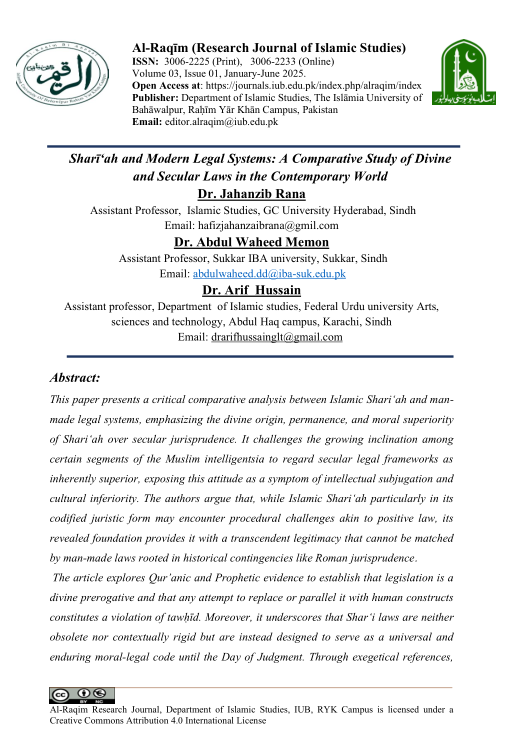Sharī‘ah and Modern Legal Systems: A Comparative Study of Divine and Secular Law in the Contemporary World
Keywords:
Islamic Shari‘ah, divine legislation, secular legal systems, Qur’ān, Prophetic traditions, tawḥīd, legal philosophy in Islam.Abstract
This paper presents a critical comparative analysis between Islamic Shari‘ah and man-made legal systems, emphasizing the divine origin, permanence, and moral superiority of Shari‘ah over secular jurisprudence. It challenges the growing inclination among certain segments of the Muslim intelligentsia to regard secular legal frameworks as inherently superior, exposing this attitude as a symptom of intellectual subjugation and cultural inferiority. The authors argue that, while Islamic Shari‘ah particularly in its codified juristic form may encounter procedural challenges akin to positive law, its revealed foundation provides it with a transcendent legitimacy that cannot be matched by man-made laws rooted in historical contingencies like Roman jurisprudence. The article explores Qur’anic and Prophetic evidence to establish that legislation is a divine prerogative and that any attempt to replace or parallel it with human constructs constitutes a violation of tawḥīd. Moreover, it underscores that Shar‘i laws are neither obsolete nor contextually rigid but are instead designed to serve as a universal and enduring moral-legal code until the Day of Judgment. Through exegetical references, prophetic traditions, and insights from classical and modern scholars, the article affirms that true faith (īmān) necessitates complete submission to divine legislation, and that any deviation toward ṭāghūt or secular authority undermines the very foundation of Islamic belief and identity.

Downloads
Published
Issue
Section
License
Copyright (c) 2025 Dr. Jahanzib Rana, Dr. Abdul Waheed Memon, Dr. Arif Hussain

This work is licensed under a Creative Commons Attribution-NonCommercial 4.0 International License.




